Reporting Conditions can be set to log user actions during the booking process. This process helps to identify travel policy compliance, and the information captured can be documented within the PNR (Trip) in remark fields, UDIDs, sort fields, etc.
This article will show you, the TMC Administrator, how to create and edit Reporting Conditions.
Step 1: On the Nexonia Travel homepage, click the Admin menu, followed by Policy Setup, then Reporting Conditions.
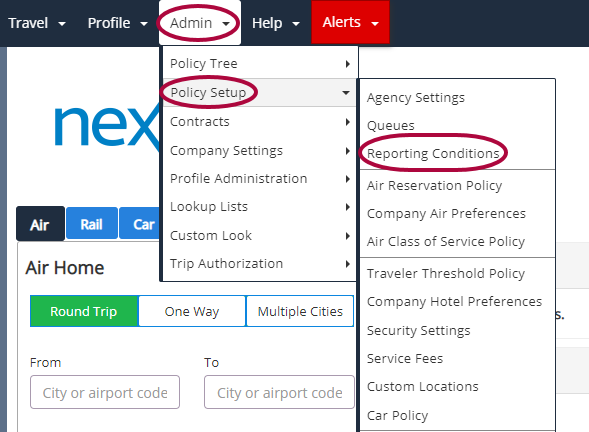
Step 2: From the Reporting Conditions list section, select the Add New Reporting Condition link.
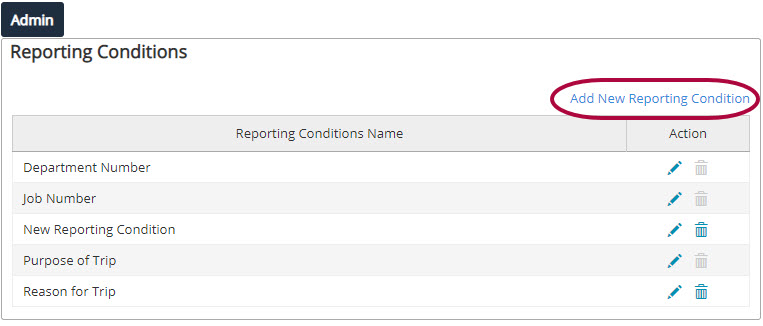
Step 3: Fill in the fields on the Reporting Conditions screen.
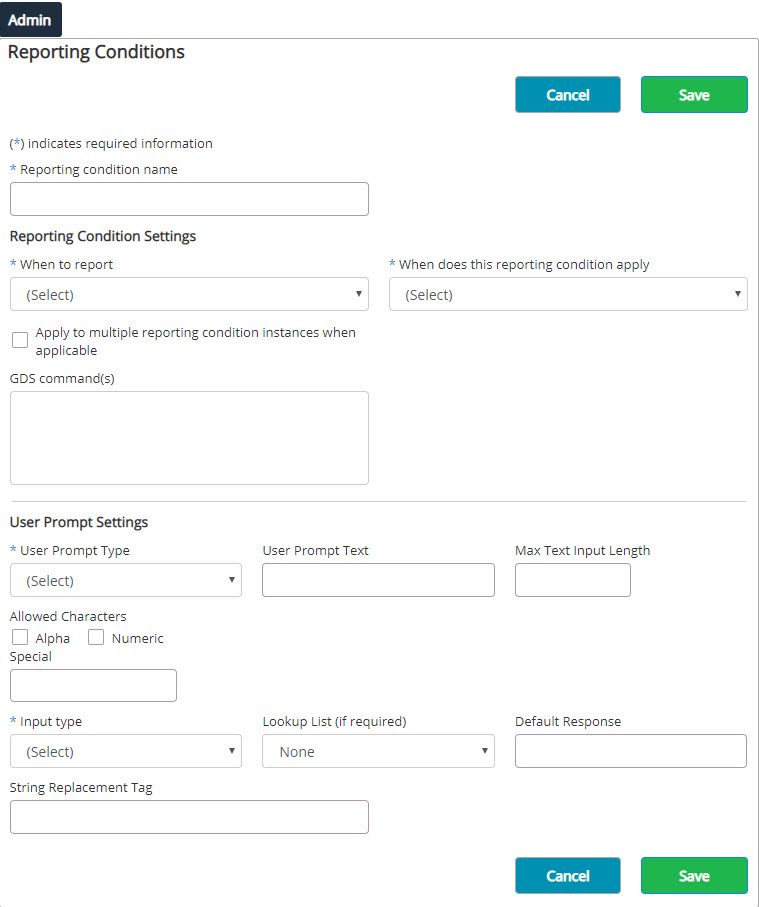
Reporting Condition Name - The name of this specific reporting condition.
When to Report - The selection in this field will tell Nexonia Travel when to report on an employee action.
- When Purchase Air Now - When the user clicks Purchase for a trip.
- When selecting of modifying air reservation - When the user reserves or modifies an air leg.
- When selecting first air reservation - When the user reserves their first air leg.
- When selecting or modifying car reservation - When the user reserves or modifies a car segment.
- When selecting or modifying hotel reservation - When the user reserves or modifies a hotel segment.
- When reserving a trip template - When the user reserves a trip from a trip template.
- When a PNR is being created - When the user reserves or purchases a trip for the first time.
- When any reservation is occurring - When the user makes a reservation of any type (Reserve, Purchase, or Modify).
- After a PNR is ended - When the user adds information to a PNR after End Transaction.
- When a PNR is in progress - When the user adds information to a PNR prior to End Transaction.
- When selecting or modifying a parking segment - When the user reservers or modifies an airport parking segment.
When does this reporting condition apply - Select when the system should report on an employee action.
- Always - The reporting condition is applied all the time.
- No Overnight Hotel - When an overnight stay occurs in a trip, and no hotel is reserved.
- No Rental Car - When a stay longer than six hours occurs in the trip and no car is reserved.
- No Return Flight - When the trip does not contain a return flight.
- Didn't Take Offered Contract Car - When the user does not select a contract car option.
- Didn't Take Preferred Hotel Contract Rate - When the user does not select the contract rate at a preferred hotel.
- Didn't Take the Lowest Air Fare - When the user does not select the lowest fare option.
- Didn't Take Preferred Air Option - When the user does not select the preferred air option.
- Didn't Take Any Offered Air Contract - When the user does not select any offered air contract.
- Didn't Take the Offered FEMA Compliant Hotel - When the user does not select an offered FEMA compliant hotel.
- Reserved Air Out of Policy - When the user reserves air that violates their company policy.
- If hotel consolidator is chosen - When the user selects a hotel under the company's hotel consolidator policy.
- When Parking segment is reserved - When the user adds parking to the itinerary.
- Didn't take offered air contract (Contract Name - When the user does not select an option under the specific air contract named.
- When Purchase Now Rail - When the user clicks Purchase for a trip that includes rail.
- When selecting first rail reservation - When the user reserves their first rail leg.
GDS command(s) - The GDS command to insert the information into the PNR.
- If a lookup list is references, enter (CODE) or (DESC) where the user information from the lookup list should be inserted (see Lookup Lists). (CODE) inserts the item from the code column of the lookup list and (DESC) inserts the item from the description column.
- Two string replacement tags are available for use in the GDS Command(s) for car only and hotel only reporting conditions.
- CurrentCity - The city where the hotel is located or the car is picked up based on the applicable reporting condition and travel segment.
- CurrentDate - The date of hotel check-in or car pick-up based on the applicable reporting condition and travel segment.
User Prompt Type - The effect of the prompt on the user.
- Do not prompt the user
- Prompt the user, response not required
- Prompt the user and require a response
User Type - The type of users to whom the reporting condition applies:
- RESX only.
- SELEX Agent Desktop only.
- All users (those who book in both RESX and SELEX Agent Desktop).
User Prompt Text - (For use with the User Prompt Type field). Enter instructional text for when the user is prompted to respond to the reporting condition.
Max Text Input Length - Enter the maximum number of characters the user can use to respond. This helps ensure the GDS entry does not fail when there is a character limitation to the entry.
Allowed Characters - Enter the type of characters with which the user can respond:
- Alpha
- Numeric
- Special - Enter any special characters here. Ex: $,@,# (do not need to be separate by commas).
Input Type - The type of field used to collect the user's response:
- Drop-down List Box (Auto-Complete)
- List Box
- Text Box
- Verified Text Box - The text entered is verified against a lookup list.
Lookup List (if required) - Select the Lookup List that contains the choices for the questions presented to the user. If you are not referencing a Lookup List select "(none):.
Note: The lookup list must be attached to the same Policy Tree Branch as the reporting condition unless it is a custom lookup list.
Default Response - Text displayed in a text box or verified text box by default. This text is attached to the GDS command unless the user replaces it with a response.
String Replacement Tag - The unique tag that allows the reporting condition to be used in another area.
Step 4: Click Save to complete.
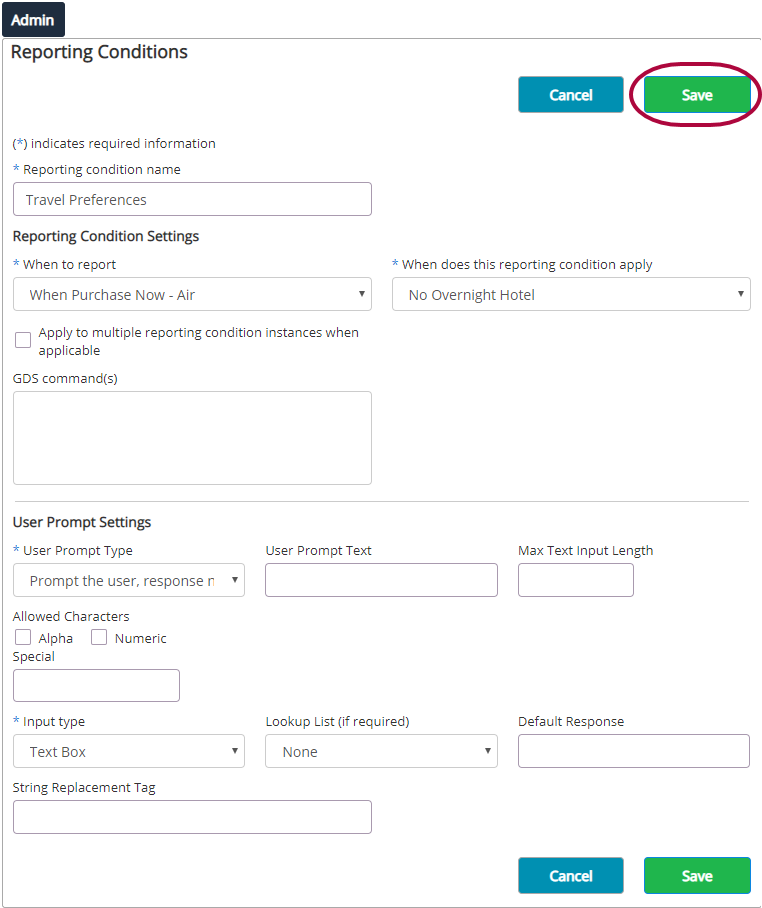
Step 5: Once you've saved the reporting condition, you are returned to the Reporting Conditions page where the new condition has been added to the list.
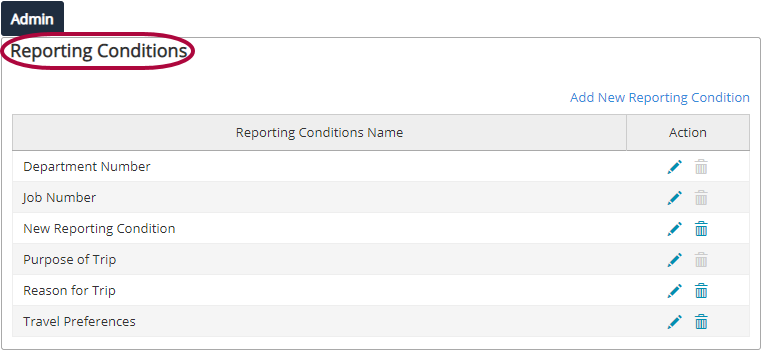

Comments
0 comments
Article is closed for comments.